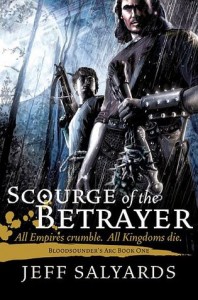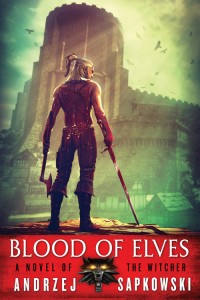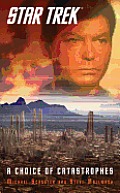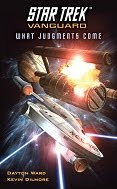Over the last couple years I've been heartily enjoying
The Shadow Saga (Pyr) by Jon Sprunk and this last week saw its stunning conclusion in print. My interest in this series was first piqued when I saw the excellent Michael Komarck cover for
Shadow's Son (see below) and it's been a great ride since.
This trilogy revolves around an assassin named Caim and his Fae (and invisible) companion, Kit. While starting off centered around assassination, the series evolves into a much more epic adventure filled with action.
Thanks to Jon for stopping by, he was nice enough to let me pepper him with questions even as he had a very busy week due to the release of the final volume in
The Shadow Saga,
Shadow's Master.
Check out my reviews for
Shadow's Son,
Shadow's Lure, and
Shadow's Master.
----------------------------
- Can you introduce yourself and tell us about your debut
work, The Shadow Saga?
Of course! I live in
central Pennsylvania with my family. My first fantasy novel, Shadow’s Son,
was published in the summer of 2010 by Pyr Books. Since then volumes two and
three (Shadow’s Lure and Shadow’s Master, respectively) have been
released, and the books have also been published overseas in eight or nine languages.
Shadow’s Son
tells the tale of a lonewolf assassin named Caim who gets pulled into a
government plot involving an extinct dynasty, a powerful religious body, and a
particular brand of dark magic. In the subsequent books, Caim goes back to his
homeland (and beyond) to track down the people who killed his father and
abducted his mother.
- The Shadow Saga has been called good ol’ fashioned sword and
sorcery, being compared to such greats as Michael Moorcock and Fritz Lieber. Is
this an accurate assessment? How would you categorize the series?
I remember when I was
pitching the first book, I just called it fantasy, or maybe ‘dark’ fantasy
because of its themes, but since then the series has been deemed sword &
sorcery, which I think is awesome because I grew up on Moorcock, Leiber,
Howard, and so on. But I don’t get too hung up on categories. Hell, on Amazon
the first two books are placed under “Historical Fantasy,” for what that’s
worth.
- What book got you into fantasy? Was there anything that made
you think, “I can do that?” Also, what is a book we should drop everything to
read?
I don’t recall any
single book that made me realize fantasy was the genre for me, but I’m sure all
the Conan books I read as a kid didn’t hurt. The Lord of the Rings
was certainly instrumental (although I never thought I’d be able to match it in
scope or grandeur).
As far as
recommending a book, there are too many to list. I think The Black Company
(Glen Cook) was revolutionary. Robert E. Howard, although a flawed person
(aren’t we all?), wrote some marvelous stories. Same with H.P. Lovecraft and
Clark Ashton Smith.
- Caim is the ultimate assassin, but he’s got heart as well.
How did Caim come about and how much is he a part of you?
Let me answer that in
reverse order. Caim is nothing like me. Although I started training in various
martial arts when I was ten years old, I work studiously to avoid the kinds of
violent situations where Caim feels most at home. Then again, both Caim and I
have little patience for assholes, so you never know . . .
When I was planning
the series, my main character was originally going to be a break-in artist. A
cat-burglar who would avoid fights rather than engage. Yet as I fleshed out the
story, I realized that I wanted a more visceral experience that included
violence. That’s when I remembered a few chapters of a novel I had written
years before and abandoned, about an assassin who gets betrayed by his employer
and goes on a homicidal rampage. I took that character and retooled him to fit
the story of Shadow’s Son. And the rest is history.
- What is it about assassins that you like so much?
I don’t particularly
like assassins, although in another life I think I might have been a good one.
I like reading about assassin though,
because they break one of the basic rules of society. Thou shalt not kill. And
once you go there, turning back is extremely difficult. That was the story I
wanted to tell in this series, about one very flawed man’s attempt to redeem
himself. Or at least to make sense of the shambles his life has become.
- Kit is one of my all-time favorite characters and one of the
things that really sets this series apart. What was the inspiration for her? Who
came first, the world (including shadows), Caim, Josey or Kit?
 Kit is a happy
accident. I didn’t have her in my initial outlines. Yet, when I started writing
that first scene with Caim in the duke’s castle, Kit just appeared. And she’s
been flitting in and out of Caim’s life ever since. I think some of my
inspiration for her might have come from Tinkerbell as played by Julia Roberts
in the movie Hook, her unrequited longing for Peter. For a kid’s movie,
it’s a very grown-up sentiment.
Kit is a happy
accident. I didn’t have her in my initial outlines. Yet, when I started writing
that first scene with Caim in the duke’s castle, Kit just appeared. And she’s
been flitting in and out of Caim’s life ever since. I think some of my
inspiration for her might have come from Tinkerbell as played by Julia Roberts
in the movie Hook, her unrequited longing for Peter. For a kid’s movie,
it’s a very grown-up sentiment.
The story idea came
first, including the primary characters. Things like setting and the shadow
magic came later.
- Who is the character you most enjoyed writing, had the
hardest time writing? (I guess they can be one and the same too)
Caim and Ral were the
easiest. Their sections seemed to ‘click’ in my head without too much anxiety.
Kit was more of a challenge when I had to write her perspective in the later
books. Maybe I was self-conscious about trying to get her Fae-ness “just
right.” And all the villains are pretty smooth for me. I like the darker sides
of people.
- How did you come up with the language for the Northmen? I’ve
been known to speak some German and I noticed at least a bit of Scandinavian
influence.
I’m no Professor
Tolkien, so don’t dig too deeply!
For the Northmen, I
knew I wanted them to resemble the various tribes of northern Europe, so I started
with Old Norse as a basis for the words and names, and changed them a bit to
make it more unique.
- Do you have any plans to go back to the Shadow Saga now that it's finished, whether it's sequels, prequels or novellas?
The short answer is: not at this time. I think there's still a lot to explore with Caim and Kit and Josey (and Hubert, too), but I'm a one-project-at-a-time kind of guy and all my energy is going into this new book.
- What else do you have in store for us? I know there’s some
mysterious “work in progress” going on, can you tell us more about it?
There’s always
something in the works. Up next is an epic fantasy series centering around two
soldiers captured by a foreign land ruled by wizard-kings (and –queens). These
soldiers both fight to be free again, but their battles take them down
divergent paths.
- What kind of writer are you, there’s always discussion about
outliners versus free-writers? Do you fall into any of those? And what was the
hardest part about writing this series?
 I’m an outliner. It’s
just how my brain constructs a story.
I’m an outliner. It’s
just how my brain constructs a story.
The hardest part of
writing this series was how to end it. Ending a novel is difficult enough for
me as I try to pull together all the storylines and themes into something
satisfying. Concluding a series is like that, but harder because you’re drawing
that last novel to a close while at the same time pulling together the whole
saga. Or, at least I tried to.
- Any advice for wannabe writers in getting published or just
plain writing something people want to read?
There are a few
things I’ve picked up that are as near to “rules” as I can see.
One, read. If you
don’t love to read fiction, falling so deeply into a book that you lose track
of time, writing as a profession probably isn’t for you.
Two, write. A lot. I
write almost every day. That includes Christmas, my birthday, my wife’s
birthday, and every day in between except when I’m on vacation.
Three, develop
patience. Just about every aspiring author imagines their first book will be
published, resulting in a life of fame and wealth. The reality is somewhat less
impressive. You’ll likely write several books (including months of revising and
re-revising each one) before you get published. This means years of toil for no
pay and no accolades. Get used to it. Because once you are published, riches
and awards are the exception, not the rule. You might be the next J.K. Rowling,
or you might die penniless and unknown. If you have talent in any other
profession, I advise you (strongly) to pursue that instead. But if you simply
cannot not write….
Four, develop a thick
skin. Once you are published, your beloved book will be out in the cold, cruel
world where people will trash it, mock it, and publically ponder whether or not
you are an imbecile. If you are easily discouraged by negative criticism, save
yourself a lifetime of abuse and take up knitting.
- How much of an impact do you think social networking, either
through your own efforts or others has had with your series?
At first, I would
have said none. But over the last couple years I have gained a small (but
loyal!) social media following. They help me spread the word about my work, so
I think it depends on luck and how much you put into it.
- Do you read every review of your books and does anything
that is said influence anything you do?
I read all the ones
that I know about. The interwebz is a huge place, so there are probably things
said about my books (and me) that I never see. I like knowing how the series is
hitting people. I don’t know if it actually influences me, except that if I saw
the same criticism again and again and I thought it was valid, I might try to
address it in future works.
But probably not. I’m
a stubborn bastard at heart.
- If you were to see someone reading your book in public (like
on a bus or something) what would you do?
Smile and go on with
my day.
 Wurts is an incredible writer in so many ways and what I
really noticed is her ability to combine the "show don't tell" advice
that's the typical writing advice with the moments when it's just better
to tell. Character traits will be displayed through action or dialogue,
but sometimes it's just better to tell a few things and Wurts is the
master at it.
Wurts is an incredible writer in so many ways and what I
really noticed is her ability to combine the "show don't tell" advice
that's the typical writing advice with the moments when it's just better
to tell. Character traits will be displayed through action or dialogue,
but sometimes it's just better to tell a few things and Wurts is the
master at it.


































